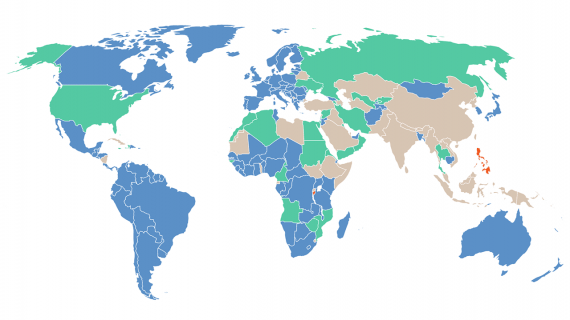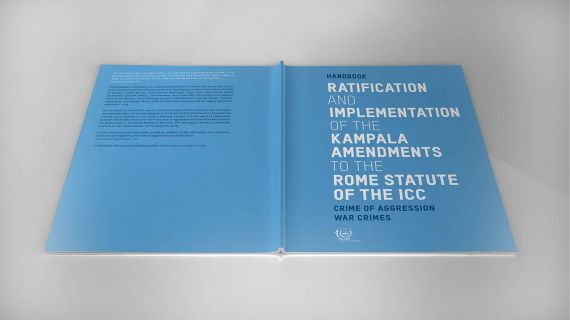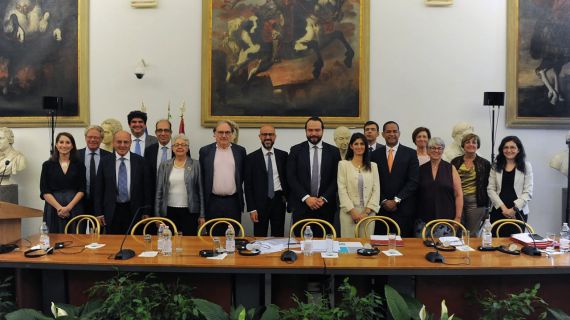Rome:
In the same City in which the Rome Statute of the International Criminal Court (ICC) was adopted 23 years ago, the Italian Parliament [passed with an overwhelming majority] the draft law concerning the ratification of the Kampala Amendments on the crime of aggression and war crimes, which were adopted in 2010 by the first Review Conference of the Statute. Italy will become the 42nd State to ratify the amendments. The amendments on the crime of aggression entered into force in 2018 (after 30 States Parties to the Rome Statute ratified the amendments) while those on war crimes still require ratifications by 7/8 of the 123 States Parties before becoming effective. For more insight and context, see PGA’s webpage on its ICC campaign.
The Chair of the PGA Italy National Group, Lia Quartapelle, MP, welcomed this important development stating:
Italy and the European Union are determined supporters of the ICC, which is more important than ever at a time in which we are witnessing the rise of authoritarianism, violent extremism and insurgencies that are propelled by mass atrocities against civilian populations: In the face of the return of a Taliban-led Afghanistan, the senseless war in Yemen, the enslavement of girls and children by groups like Boko Haram and the widespread persecution of dissidents by dictatorial leaders in Myanmar and Belarus, it is an imperative for States to join the ICC by ratifying the Rome Statute and its amendments, hence universalizing the system of norms and institutions that we have been created for the global fight against impunity.
The Rapporteur of the draft law, former Speaker of the Italian Chamber of Deputies and Chairperson of the Human Rights Committee, Laura Boldrini, stressed that
The ratification of the Kampala Amendments on the crime of aggression and war is yet another step that Parliamentarians are undertaking to advance the protections for victims of the aggressive use of force and for victims of atrocities during armed conflict: It is the responsibility of Members of Parliaments in every functioning democracy to ensure that their States are parties to multilateral organizations such as the ICC in order to better protect and promote universal human rights for all.
Hon. Boldrini delivered this statement right after the adoption of the law that she presented in the Plenary of the Lower House. In this respect, it must be underscored that normally Parliament authorizes the Executive to ratify an international treaty upon request by the Executive itself. In the case of today’s ratification, Parliamentarians replaced the Executive to accomplish this task.
On 2 March 2021, PGA’s Secretary-General Dr. David Donat-Cattin was heard as expert during a session of the Foreign Affairs Committee of the Chamber of Deputies. The Committee decided to take action and approve the project of law right after his testimony, in which he underscored that
The Kampala Amendments on the crime of aggression are bringing back to unity the system of international criminal justice set up in Nuremberg in 1945. Since then, the crime of aggression is one of the most serious crimes of international concern together with genocide, as codified in the 1948 Convention against Genocide, crimes against humanity, and war crimes. Nevertheless, the definition of aggression had not been included in the 1998 Rome Statute and in the 1993/94 Statutes of the ad hoc International Criminal Tribunals for the former Yugoslavia and Rwanda (ICTY-ICTR). Following the entry into force of the Kampala Amendments, if the UN Security Council will decide to refer a new situation to the jurisdiction of the ICC – as it did in 2005 regarding Darfur/Sudan and in 2011 regarding Libya – under Chapter VII of the UN Charter, it will do so for all the international crimes that may have been committed in a given situation. This will mean that the ICC will be able to independently exercise jurisdiction on any of the four core crimes under International Law, including aggression/crimes against the peace.
The Italian Parliament’s decision to ratify the Kampala Amendments reinforces the commitment of the global network of Parliamentarians for Global Action to continue its worldwide campaign for the universal ratification and effective implementation of the amended Rome Statute in all regions of the world.
Legislative background and analysis on next steps towards full implementation of the Rome Statute
Italy’s draft law on the ratification of the Kampala Amendments (XVIII Legislatura - Progetto di Legge C. 2332) is a private member’s bill initiated in 2014 by the Senator Alberto Airola, who re-deposited it in the current Legislature on 17 July 2018 to mark the 20th anniversary of the Rome Statute. The initiative accorded with the European Parliament Resolution on the Crime of Aggression of 17 July 2014, initiated by Members of the PGA EP Group Barbara Lochbihler (former MEP, Germany), Helmut Scholz (MEP, Germany) and Marietje Schaake (former MEP, Netherlands), who had co-hosted a strategic session with the late Hans Pieter Kaul (ICC Judge, previously Head of the German Delegation to the Rome Diplomatic Conference on the ICC).
The draft law was first announced in the City Hall of Rome on 18 July 2018 by the current Chair of the PGA Group in the European Parliament Fabio Massimo Castaldo (MEP, Vice-President of the EP with portfolio responsibility on human rights and democracy) on the occasion of the PGA’s Conference on the Commemoration of the 20th Anniversary of the Rome Statute of the ICC.
Upon proposal by the Executive, Italy ratified the Rome Statute of the ICC in 1999. The Rapporteur was Ersilia Salvato, Vice-President of the Senate and PGA Member. Subsequently, Italy ratified the amendment eliminating the transitional provision on war crimes (Art. 124) from the Statute in 2017.
Italy implemented the obligation to cooperate with the ICC with Law n. 237/2012, adopted by Parliament one week before the latter hosted the Consultative Assembly of Parliamentarians for the ICC and the Rule of Law - 7th session - organized by PGA in 2012.
While Italy implemented the Genocide Convention of 1948 in its penal laws, it has yet to adapt its domestic legal order to the other international crimes contained in the Rome Statute, namely crimes against humanity, the war crimes (to the degreenot covered by legislation enacted in 1941 and subsequent special laws), and the crime of aggression. According to a segment of Italian Penal Law’s scholars, Italy must also domesticate the general principles of international criminal law, such as the one of “imprescrittibilità” (non-applicability of statutes of limitations). Nevertheless, given that general principles of law stem from the Nuremberg precedent, they are firmly embedded in customary international law. Given the direct applicability in the Italian legal order of customary international law, as enshrined in Article 10(1) of the Italian Constitution (L'ordinamento giuridico italiano si conforma alle norme del diritto internazionale generalmente riconosciute), the general principles of law contained in Part III of the Rome Statute are already legally binding on Italy and hence, automatically applicable within its domestic legal order. In this respect, it is noteworthy to underscore that Article 10 is part of the section of the Constitution on fundamental principles (“principi fondamentali”). As such, it prevails over any other domestic norm. The latter view is supported by some public International Law scholars and constitutional law jurists.
Under the leadership of former ICTY President Prof. Fausto Pocar (University of Milan), a group of experts elaborated a draft Code of International Crimes for Italy, regarding which a senior State-official has recently signaled the support by the new Italian Justice Minister, Prof. Marta Cartabia, at a symposium co-organized by the 'Cesare Beccaria' Department at Milan University and the Humboldt Foundation on: "Domesticating International Criminal Justice - Current Challenges". The PGA Italy National Group is ready to strongly support a governmental legislative initiative aimed at domesticating crimes against humanity, war crimes and the crime of aggression in national law, hence filling a gap that has existed for more than two decades.







